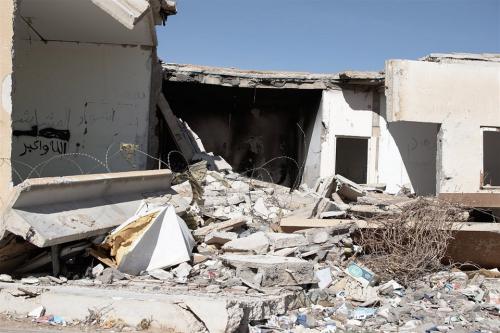Libya: UN warns of human rights violations as factional fighting continues
Libyan civilians have been subject to targeted killings, forced displacement and acute humanitarian conditions amid an escalation in fighting in the North African country, a new United Nations human rights report has warned.

A destroyed house in Ahy Badr in the town of Mizdah in the Nafusa mountains in Libya after tribal conflict in March 2013.
According to the report, released on December 23, 2014 and jointly produced by the UN Human Rights Office and the UN Support Mission in Libya (UNSMIL), civilians caught in the fighting have been subjected to indiscriminate shelling, abduction, torture and execution as well as deliberate destruction of property as factional violence ripples across the country.
In western Libya, in the area of Warshafana, fighting between rival armed groups has resulted in the deaths of an estimated 100 people and injured 500 more in a spell of hostilities that lasted from late August to early October.
At the same time, the report notes, fighting in the neighbouring Nafusa mountains left 170 people dead. In addition to the casualties, the fighting has also caused a humanitarian crisis with at least 120,000 people forced to flee their homes, resulting in consequent shortages in both food and medical supplies.
Meanwhile, in the eastern city of Benghazi, an uptick in violence has seen 450 people killed since October as residents continue to face shortages in medical care. Moreover, upwards of 15,000 families – some 90,000 people – have been displaced, according to reports received by UNSMIL.
“Dozens of civilians have been abducted by all sides, solely for their actual or suspected tribal, family or religious affiliation, often as hostages in order to exchange them for others held by the opposing side,” continues the report. “UNSMIL has also received allegations of torture and other abuses which are consistent with earlier patterns of ill-treatment of detainees, but are a cause of even greater concern because of the heightened political tensions and the ongoing active hostilities.”
In a press release accompanying the report’s publication, UN High Commissioner for Human Rights, Zeid Ra’ad Al Hussein, warned all parties involved in the violence that they remained responsible for any human rights violations committed during the fighting.
“As a commander of an armed group, you are criminally liable under international law if you commit or order the commission of grave human rights abuses or fail to take reasonable and necessary measures to prevent or punish their commission,” he explained. “I urge all those in positions of authority to declare publicly that acts amounting to violations and abuses of international human rights and humanitarian law will not be tolerated.” “All those suffering in this violence deserve to live in safety with their rights fully protected,” the Special Representative of the Secretary-General for Libya and head of UNSMIL, Bernardino Léon, added in the press release. “I appeal to all Libyan political and military leaders to engage, as a matter of urgency, in a genuine political dialogue to take Libya out of the current crisis.”
At the same time, as the situation in the country rapidly deteriorates with the displacement and re-displacement of populations in the western outskirts of Tripoli, Benghazi and the southern region of Ubari, the UN High Commissioner for Refugees (UNHCR) warned that Libyan civilians are facing a “deepening” humanitarian crisis as well.
Winterization items needed to shelter the displaced from the fast-advancing cold weather are increasingly in demand, the agency said in a press release, as displaced families continue to live in public facilities such as schools, parks and abandoned buildings. Nonetheless, despite the fighting, UNHCR is working to provide 2,000 sleeping mats, 1,460 mattresses, 1,590 plastic sheets, 1,485 kitchen sets, 1,620 school bags and 1,810 jerry cans to over 1,000 families in distress.
“Although the security situation in Libya continues to be volatile, UNHCR has managed to resume distribution of core relief items in the country from our warehouse,” Saado Quol, the agency’s Chief of Mission in Libya announced. “We understand assistance is also needed in the east and south, where access is severely restricted. We are exploring how additional humanitarian items can be distributed to the eastern cities.”
Meanwhile, in New York, the Security Council expressed “grave concern about the serious deterioration on the security situation and the continuing fighting” in Libya, after hearing a briefing from Mr. Léon via videoconference.
Speaking to reporters following the closed-door session, Ambassador Mahamat Zene Cherif of Chad, which holds the Council’s rotating presidency for December, said the inflow of unregulated weaponry into the country was also of concern to the 15-member body, as it was “contributing to the crisis despite the arms embargo.”
The Council reiterated its support for Mr. Léon’s mission and called on all Libyan stakeholders “to accept an immediate ceasefire and engage in the dialogue process.”
Source: United Nations
- 349 reads
Human Rights
Fostering a More Humane World: The 28th Eurasian Economic Summi

Conscience, Hope, and Action: Keys to Global Peace and Sustainability

Ringing FOWPAL’s Peace Bell for the World:Nobel Peace Prize Laureates’ Visions and Actions

Protecting the World’s Cultural Diversity for a Sustainable Future

Puppet Show I International Friendship Day 2020

